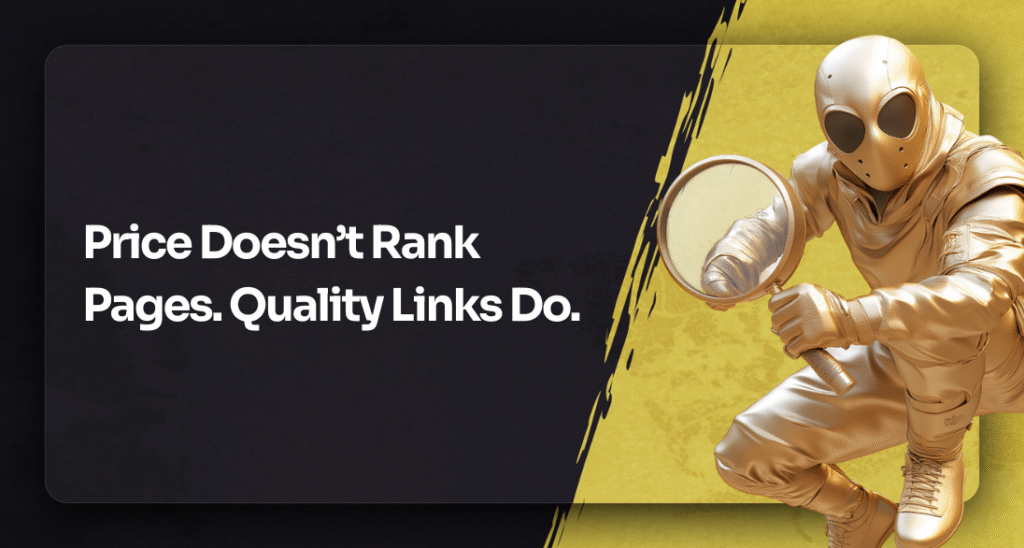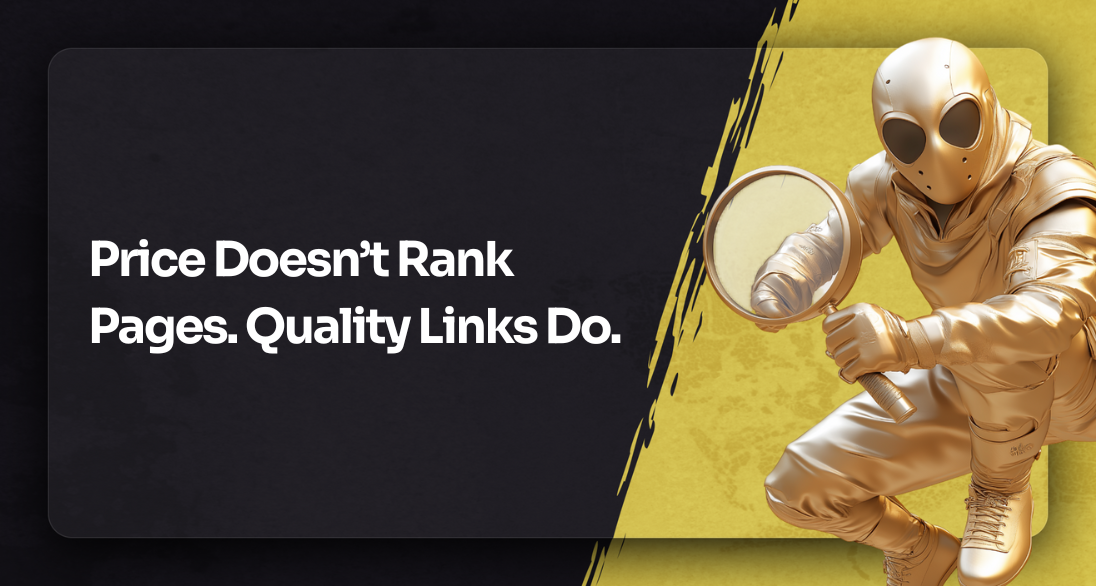Ask five agencies how much link building costs, and you’ll get five different answers.
Gone are the days when a few cheap backlinks could push your site up the rankings. Today, link building is a sophisticated process involving outreach, content creation, and forging relationships with reputable sites.
That’s why costs vary wildly: from a few hundred dollars for low-tier packages to thousands for premium link building services that deliver real authority and traffic.
So when someone asks, “How much does link building cost?” - the honest answer is: It depends on what you want the link to do.
Let’s look at what determines those price swings and why some backlinks are worth every penny while others are a waste.
What Factors Influence Link Building Pricing?
Several factors push backlink costs up or down:
- Authority of the Linking Site: A backlink from an enterprise outlet costs far more than one from a barely-known blog.
- Link Type: Editorial placements, guest posts, HARO mentions, and link insertions all have different price tags tied to effort and exclusivity.
- Content Requirements: Some links require you to produce high-quality articles, studies, or graphics - a major cost driver.
- Niche Competitiveness: Finance, legal, or tech industries often pay a premium because quality sites in those spaces charge more.
- Quality vs. Quantity: Buying 50 cheap links is easy. Landing a single, authoritative link takes more time and budget - but pays off exponentially better.
- Agency Relationships & Process: Reputable agencies with strong media relationships charge higher fees for safer, white-hat links and predictable results.
Knowing these drivers helps you avoid one-size-fits-all pricing and invest only in links that help you rank.
Premium Link Building Services vs. Basic Packages
Basic packages often promise dozens of links for a low price. But those links usually live on low-traffic blogs, generic directories, or private networks designed to sell links en masse. They might look good on a report, but they rarely help rankings (and they’re risky if Google catches on).
Premium link building services, on the other hand, aim for fewer links but from real websites with genuine audiences and authority. These agencies build relationships with editors, pitch journalists, or produce standout content worthy of earning links. It’s slower, it’s pricier, but it’s also the difference between ranking and disappearing into page three.
Signs you’re looking at premium services:
- They talk about quality placements, not just link counts.
- They show you sample publications where they’ve secured links.
- They avoid guarantees on metrics like DR or traffic because real editorial links can’t be bought off a menu.
- They’re transparent about outreach, content, and the approval process.
A cheap package might cost $300 for ten links. A premium agency might quote $1,500 for one editorial placement on a respected niche site.
So, would you rather pay once for a link that moves rankings or keep paying for links that never show results?
Analyzing Different Link Building Package Prices
Link building packages come in every shape and price point.
Here’s a snapshot of typical ranges you’ll see in 2025:
- $100 - $300 per link:
Usually mass-produced placements on low-authority blogs, generic directories, or private blog networks (PBNs). Cheap upfront but carry serious risk if Google flags them. Little to no editorial oversight. - $300 - $800 per link:
Editorial placements, reputable niche blogs, or media publications. Content is usually higher quality, with real editorial review. These links bring referral traffic and genuine authority signals. - $800 - $1,500 per link:
Premium outlets, high-authority news sites, or exclusive industry publications. Often tied to digital PR campaigns, data studies, or unique thought leadership. These are the links that make a difference in competitive niches.
What separates a good backlink from a waste of cash is what’s behind it:
- Relevance - Does the site relate to your industry?
- Traffic - Does the site have real visitors?
- Placement type - Is the link buried in a bio, or naturally included in the article body?
- Content quality - Is the article well-written and valuable to readers?
Two $1,500 links aren’t necessarily equal if one sits on a site with no audience and the other appears in an article that ranks on page one.
Price doesn’t rank pages. Quality links do.
The True Cost of Backlinks
So…how much does link building cost in 2025? The numbers alone never tell the whole story.
Some stats to set the stage:
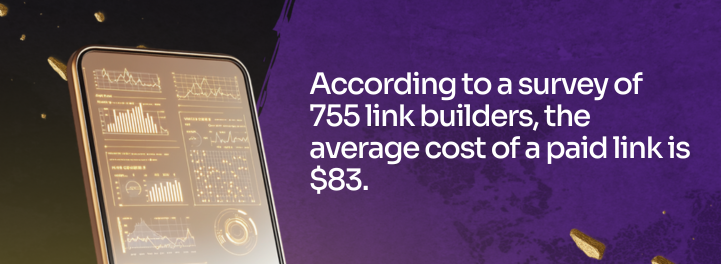
Keep in mind: these figures only cover the fee paid to place your link on a website. They don’t include the time and costs involved in creating content or reaching out to secure those placements.
But price alone doesn’t define value. And instead of asking “How much does link building cost?” the better question is: “Which links are worth my money?”
Let’s name a few.
Editorial Links
These are gold. Editorial backlinks come from mentions in articles on credible sites. Premium link building services often focus on landing these because they pass strong authority and trust.
- Cost: $300–$1,500+ per link
- Why pay for it? These links drive real SEO gains and often bring referral traffic from readers who trust the publication.
Guest Posts
A thoughtful piece on a niche authority blog is worth far more than a post on a generic site full of SEO filler.
- Cost: $200–$600 per link
- Look for sites with real traffic, engaged readers, and tight editorial standards.
Niche Directories
These are specialized directories for your industry (such as SaaS, legal, health). They’re usually inexpensive, but low-authority directories won’t do much for your rankings.
- Cost: $50–$300 per listing
- The value depends on relevance and how much traffic the directory gets.
HARO Links
HARO (Help A Reporter Out) connects brands with journalists seeking sources. Scoring a HARO backlink from reputable outlets or niche industry publications can be SEO gold.
- Cost: $0 if you do it yourself - but agencies often charge $200–$1,000+ per secured placement.
- The payoff? High DR backlinks with strong credibility.
Evaluating Link Building Service Costs
Link building prices are a mix of time, expertise, and trust. You’re paying not only for the link itself but for the experience, the connections, and the safety net that comes with working with people who know what they’re doing.
When you’re weighing link building service costs or link building package prices, remember: it’s not about how cheap the links are. It’s about how expensive it will be if you get them wrong.
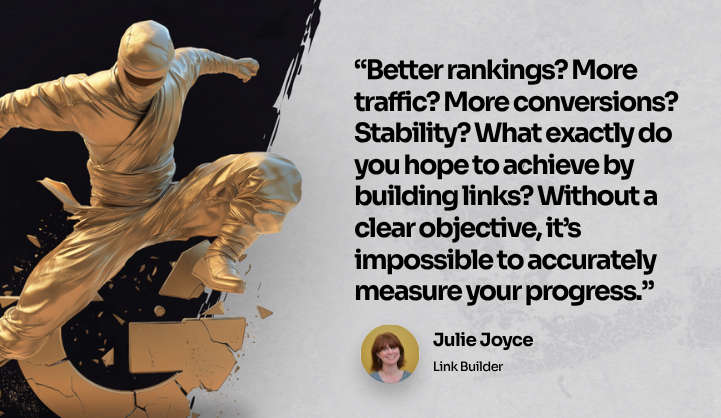
In-House vs. Agency Costs
Some businesses figure they’ll save money by keeping link building in-house. On paper, it seems cheaper than hiring an agency. But in reality:
- Expertise isn’t cheap. A SEO link builder can cost $100,000+ a year in salary alone.
- Tools aren’t pocket change. Platforms like Ahrefs, Semrush, and outreach tools can cost hundreds (or even thousands) of dollars per month.
- Content production takes time and money. Someone has to write guest posts, create linkable assets, and manage outreach. Freelance writers or internal content teams aren’t free.
An in-house team gives you full control over your link building strategy. But if they’re figuring it out as they go, mistakes can be expensive not just in dollars, but in penalties from search engines.
By contrast, link building services cost more upfront but agencies already know which publishers to pitch, how to negotiate placements, and how to protect your brand’s reputation.
Cost of Outsourcing Link Building
You’ll see everything from budget services promising links for $50 each (dangerous) to premium agencies charging $800-1,500 per link. Here’s why:
- High-authority sites with real traffic cost more.
- Quality outreach takes time.
- Quality guest posts, digital PR assets, or research pieces factor into link building pricing.
- Good agencies know how to avoid toxic links, saving you potential penalties later.
If an offer sounds too good to be true (like buying 50 links for $299) it is.
Understanding the ROI of Link Building
Focusing only on backlink price misses the bigger picture: ROI.
A single link from an industry-leading publication can send waves of qualified traffic and boost your rankings for months.
Meanwhile, bargain-bin links might look like a deal but they usually sit on sites no one reads, drive no traffic, and sometimes end up flagged by Google faster than you can say “manual penalty.”
Here’s how to think about link building ROI:
- Are those backlinks pushing you up the rankings for keywords that drive revenue?
- Is traffic flowing in from credible sites your audience trusts?
- Are those visitors doing more than browsing, like signing up, starting trials, or buying?
- And do your rankings hold steady or collapse the moment you stop building links?
Link building pricing refers to investing in your brand’s authority and future search visibility.
The cheapest link building package prices might fit your budget but they could cost you a lot more in the long run.
Some brands combine link building with PPC campaigns to capture quick wins while organic rankings grow. It’s a smart way to keep traffic flowing while your SEO investment matures.
Strategies for Effective Link Building
Two companies might each spend $5,000 a month on backlinks - but one sees rankings rise and new customers roll in, while the other wonders where the money went.
So how do you make sure your investment pays off?
The biggest pile of backlinks or the cheapest price tag won’t secure your rankings. Precision is the answer: choosing the right targets, creating content people want to reference, and avoiding shortcuts that leave your domain vulnerable when Google tightens the screws.
Let’s make sure your link building dollars aren’t going up in smoke and figure out what it really takes to turn that spend into rankings and revenue in 2025.
It often starts with a technical SEO audit. Audits help identify which pages should be link magnets, spot technical barriers that block link equity, and uncover opportunities to strengthen internal links for maximum SEO impact.
Know Your True Costs (and Budget for More Than Links)
Plenty of businesses think link building pricing is about the fee per backlink. But that’s like believing a car’s cost ends with the sticker price on the windshield.
Remember, your link building costs also include:
- Hours of research to find good prospects
- Writing guest posts, data studies, or infographics
- Outreach tools
- SEO platforms like Ahrefs or Semrush for vetting sites
- Time spent tracking results and reporting
A single, solid guest post might run you $150 to $1,000 just to produce and that’s before you pay for the placement.
Agencies typically charge $300–$1,500+ per acquired link depending on niche, authority, and difficulty.
If you’re purely chasing cheap links to lower your budget, remember what you’re risking. Google’s spam policies have become stricter than ever.
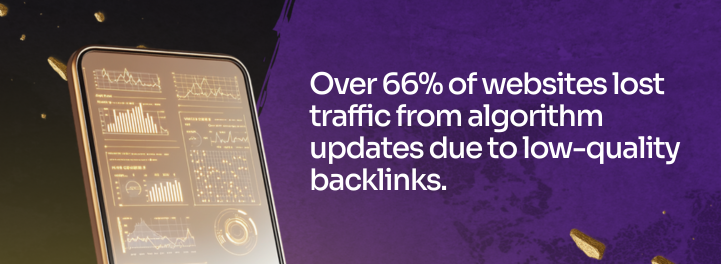
Focus on Relevance Above All
You’ll see “domain authority” shouted everywhere in link building sales pitches. And yes, high-DR sites are good but they’re worthless if they’re not relevant.
A backlink from a DR 70 real estate blog is useless if you’re selling B2B SaaS. Meanwhile, a DR 35 SaaS publication in your niche might send you buyers ready to convert.
Relevance should guide every decision about which link building package prices are worth paying. If the link doesn’t fit your topic, skip it - no matter how cheap or authoritative it seems.
Build Content Worth Linking To
The best content grabs attention because it’s useful, original, or genuinely interesting. It solves real problems, offers insights no one else has shared, or packages complex topics in a way that’s easy to understand.
Here’s what works best in content creation:
- Original data or research (e.g. surveys, unique industry reports)
- Comprehensive guides solving specific problems
- Free tools or calculators that others want to share
- Unique thought leadership rather than regurgitated “top 10 tips” lists
Understand That Good Links Aren’t Instant
The best links often take weeks or months to secure. Editorial teams review submissions. Guest posts sit in content calendars. Outreach may require several follow-ups.
If a vendor promises dozens of links next week for peanuts, run.
Evaluate Link Building ROI Like an Investor
Instead of asking “How much does backlink cost?” flip the question:
“How much revenue will this backlink help drive over the coming months?”
If you pay $800 for a single link on a DR 60 SaaS blog that sends you two conversions worth $3,000 in lifetime value - that’s a win.
Conversely, 20 cheap links at $50 each from irrelevant blogs won’t pay back anything and might even damage your rankings.
A good rule of thumb: focus on link opportunities that align with your business KPIs.
Choose Link Building Packages with Eyes Wide Open
Before you pay:
- Ask for the site list. Established vendors will share examples so you can check quality, niche relevance, and traffic.
- Confirm how your link will appear. A link placed mid-article where readers engage beats one hidden away in a bio box.
- Understand editorial standards. Will your link be surrounded by quality writing, or stuffed into low-value filler?
- Know the timeline. Quality placements take time. Lightning-fast promises usually mean lower-tier sites.
- Ask about link protection. What’s the policy if a link gets removed months later? Serious providers offer replacements or refunds.
Don’t rely on general promises. A solid link building package should show you exactly what you’re paying for and why it’s worth the cost.
Wrap Up
We’ve seen companies blow $50,000 on link building that left them with nothing but spreadsheets full of worthless URLs.
That’s why we never tell clients, “Link building costs X dollars.”
Instead, we ask:
“What do you want these links to do for your business?”
Because if you’re only counting the backling price, you’re missing the real investment. You’re paying for expertise. For research. For relationships. For content that doesn’t just exist but grows your website traffic.
A hundred irrelevant backlinks might look impressive. But we’d rather secure one that helps you outrank your biggest competitor.
So here’s our stance:
- We won’t sell you links we wouldn’t stake our own rankings on.
- We’ll charge what it takes to get you links that last and drive results.
- And if a link won’t bring you closer to your business goals, we’d rather tell you no than take your cash.
So before you sign any contract, ask your provider one question:
“If this were your site and your money, would you build these links and why?”
If the answer’s anything less than hell yes with clear arguments, walk away.
Frequently Asked Questions
Q: How much does link building cost in 2025?
A: There’s no single price tag. In 2025, link building costs range anywhere from $100 for low-tier placements on obscure blogs to $1,500+ for editorial links on respected industry sites. But price alone doesn’t tell the whole story. The more important thing is: Will that link help you rank and bring qualified traffic or will it eat your budget?
Q: Why do premium link building services cost more?
A: Professionals behind premium link building services don’t settle for tossing your link onto random blogs. They cultivate relationships with reputable editors, craft valuable content, and secure placements on sites that attract real readers. You’re paying for their connections, experience, expertise, and the ability to earn links that withstand Google’s toughest updates.
Q: Is it cheaper to do link building in-house?
A: On paper, yes. In reality? Not always. An experienced SEO pro might cost you $100,000+ a year in salary, plus thousands for tools like Ahrefs and Semrush. And that’s before you pay for content creation and outreach time. Sure, digital marketing agencies cost more. But so does wasting years on trial runs that never rank.
Q: What’s the difference between editorial links and guest posts?
A: Both are solid link types but editorial links are earned organically when journalists or bloggers mention your brand without you pitching a guest article. Guest posts, on the other hand, are articles you write for someone else’s site. Editorial links pack a bigger punch because they’re viewed as unbiased endorsements.
Q: Are cheap backlink packages risky?
A: Absolutely. Those “50 links for $299” deals often come from private blog networks (PBNs) or spammy directories. If Google catches on, you could get a manual penalty.
Q: How do I know if a backlink is worth the cost?
A: Ask yourself a few key questions:
- Does the site have real traffic and an audience in your niche?
- Is the link placed naturally inside quality content?
- Will the link send potential customers your way or is it there to manipulate rankings?
If the answers are “yes,” you’re likely looking at a link worth investing in.
Q: How long does it take to see results from link building?
A: Don’t expect overnight miracles. Even the best link building campaigns take several months before you see rankings shift. Google needs time to crawl, index, and evaluate your new backlinks. Fast, cheap links often backfire; slow and steady wins the race.
Q: What’s the ROI of link building in 2025?
A: ROI comes down to this: Do your links help you rank for keywords that bring revenue? One $1,000 link that generates $10,000 in sales is a bargain. Ten $50 links that do nothing are a waste. Measure ROI by rankings, referral traffic, and how many visitors convert.

